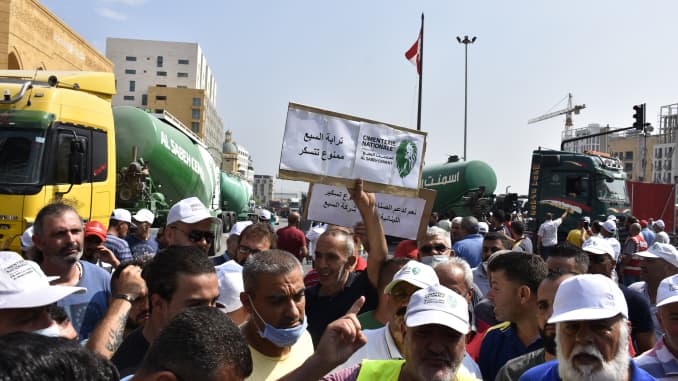
By Emma Graham — CNBC.com — Lebanon is in the throes of multiple crises, as Prime Minister Hassan Diab approaches five months in office. The small Mediterranean country of nearly 7 million people is in the midst of an economic meltdown, with fuel shortages and power cuts adding to the hardship faced by many nationwide. The country’s unemployment rate stood above 30% at the end of May, while annual food inflation has skyrocketed to around 190%. “The only card that is remaining is the street,” Henri Chaoul, former advisor to Lebanon’s minister of finance told CNBC’s Hadley Gamble on Thursday.
Speaking to CNBC about recent street protests, Chaoul said he does not know what the trigger is going to be, adding that the political setup in Lebanon cannot evolve. “It needs a revolution, not an evolution, to move to the next stage in our political discourse.” Power cuts across the capital city of Beirut have exceeded 20 hours a day in some areas. The darkness, extreme even for Lebanon, is caused by fuel shortages and lawmakers have warned they could last another two weeks. Lebanon’s electricity shortage has caused the main hospital in Beirut to shut down operating rooms and delay surgeries. “Clouds are gathering and we might be heading into a storm,” Firass Abiad, director general of the Rafic Hariri University Hospital, said via Twitter on Friday.
Lebanon ‘needs a revolution’ to overhaul its national crisis, says former IMF negotiator “If we do, what is the current capacity of our hospitals considering recent events? Will we be forced into another lockdown? Can we still change course and avoid a surge? We can, but it will not be easy,” he added. To date, Lebanon has recorded more than 2,000 cases of the coronavirus, with 36 related deaths, according to data compiled by Johns Hopkins University. Chaoul, also the founder of financial advisory firm Levantine Partners, said: “There is nothing that is being done. There is actually an alignment of stars on the dark side of the room,” adding that banks want to put the burden on depositors. Purchasing power of the Lebanese pound has reportedly hit a new low of 9,000 to the U.S. dollar on the black market. Unofficial capital controls remain in place and citizens are asking expats returning for the summer to bring cash back into the country.
The Lebanese pound, which has been pegged to the U.S. Dollar since 1997, has lost 80% of its value on the black market since October. “There is no longer any policy anchor for the pound,” Nasser Saidi, the country’s former economy minister and vice governor of the central bank, told CNBC’s Hadley Gamble on Friday. “There is no appetite for reform, no political courage to address Lebanon’s problems,” he added. Saidi compared Lebanon’s political and economic woes to crisis-stricken Venezuela, coining his home country “Libazuela.” Lebanon is seeking a $10 billion loan from the International Monetary Fund and has held at least 16 rounds of negotiations.
Chaoul, who was helping to advise the finance ministry on these talks told CNBC that: “the political class will continue to give lip service to the public on issues like wanting IMF help or implementing reform, but this has been done for the last 30, 40, 50 years. Real reforms are just not happening.”



